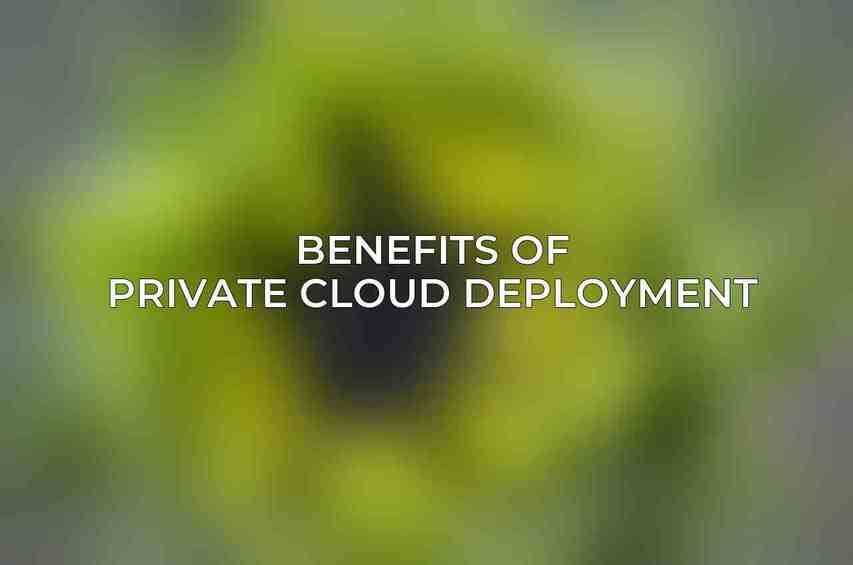Private cloud deployment refers to the implementation of cloud computing resources dedicated to a single organization, offering enhanced control and security over data and applications. The private cloud model provides a range of benefits while also presenting challenges that organizations need to navigate.
Definition and Overview of Private Cloud Deployment
Private cloud deployment involves the utilization of cloud computing resources exclusively by a single organization, whether hosted on-premises or through a third-party provider. This deployment model offers greater control and customization options compared to public cloud services.
Benefits of Private Cloud Deployment

- Enhanced Control and Security: Organizations have full control over their data and can implement tailored security measures.
- Optimized Infrastructure Utilization: Resources can be allocated efficiently based on specific requirements.
- Reduced Costs: Private clouds can lead to cost savings through better resource allocation and reduced downtime.
- Improved Scalability and Flexibility: Scalability is more manageable, allowing for rapid adjustments to meet changing demands.
Challenges of Private Cloud Deployment
- Higher Initial Investment: Setting up a private cloud infrastructure may require significant upfront costs.
- Complexity of Management: Managing a private cloud can be challenging, requiring specialized skills and expertise.
- Need for Skilled IT Staff: Organizations need trained professionals to operate and maintain private cloud environments effectively.
Technological Infrastructure for Private Cloud
The technological infrastructure of a private cloud deployment involves a combination of hardware and software components to create a robust and reliable environment.
Hardware Components
When setting up a private cloud, organizations need to consider the following hardware components:
| Component | Example Models |
|---|---|
| Servers | Dell PowerEdge, HP ProLiant |
| Storage | NetApp FAS, Dell EMC Unity |
| Networking | Cisco Catalyst, Juniper EX Series |
Software Components
The software components essential for private cloud deployment include:
1. Virtualization Platform: Such as VMware vSphere, Microsoft Hyper-V.2. Cloud Management Platform: Like OpenStack, VMware Cloud Director.3. Security Tools: Including firewalls and intrusion detection systems.
Deployment Models
Various deployment models are available for private cloud implementations, each with its own set of benefits and challenges.
On-Premises Deployment
On-premises deployment involves hosting the private cloud infrastructure within the organization’s premises.
– Benefits: Maximum control, security, and customization options.
– Challenges: High initial costs and resource-intensive management.
Managed Private Cloud Deployment
A third-party provider manages the private cloud infrastructure on behalf of the organization.
– Benefits: Reduced operational burden and access to professional support.
– Challenges: Limited customization options and dependencies on the vendor.
Hybrid Private Cloud Deployment
Combining elements of private and public clouds, the hybrid model offers a flexible solution.
– Benefits: Allows for cost optimization and balances control and flexibility.
– Challenges: Integrating and managing diverse cloud environments can be complex. Learn more about How to Choose the Perfect Cloud Deployment Model for Your Business Needs
Implementation and Management
Successful implementation and management of a private cloud deployment involve meticulous planning, efficient execution, and ongoing monitoring.
Planning and Design
- Determining Business Requirements: Understanding the organization’s needs and objectives.
- Designing the Cloud Architecture: Creating a scalable and resilient infrastructure.
Implementation
- Installing and Configuring Hardware and Software: Setting up servers, storage, networking, and software components.
- Migrating Workloads to the Cloud: Transferring applications and data to the private cloud environment.
Management
- Monitoring and Performance Optimization: Keeping track of resource usage and fine-tuning performance.
- Security Management and Compliance: Implementing security measures and ensuring regulatory compliance.
- Capacity Planning and Forecasting: Anticipating resource needs and scaling infrastructure accordingly.
Case Studies and Use Cases
Examining real-world examples can offer insights into the practical benefits and challenges of private cloud deployments.
Example of a Private Cloud Deployment in Healthcare
Implementing a private cloud in healthcare settings can enhance patient data security, compliance with regulations, and accessibility to critical information.
Case Study: Private Cloud for a Financial Institution
For financial institutions, managing high-volume transactions and ensuring data integrity are primary challenges in private cloud deployment.
Use Case: Private Cloud for Software Development
Utilizing a private cloud for software development can facilitate agile practices, boost productivity, and expedite time-to-market for products. You can find more information on Ultimate Guide to Cloud Deployment Models: Understanding Your Options
Future of Private Cloud

Looking ahead, the future of private cloud deployment is shaped by emerging technologies, evolving trends, and the need to address new challenges and opportunities.
Trends and Innovations
- Hyperconverged Infrastructure: Streamlining infrastructure by integrating computing, storage, and networking.
- Artificial Intelligence for Cloud Management: Leveraging AI for automation, predictive analysis, and resource optimization.
Challenges and Opportunities
- Managing Multi-Cloud Environments: Addressing the complexity of operating across multiple cloud platforms.
- Balancing Security and Flexibility: Ensuring data protection while maintaining operational flexibility.
- Optimizing Cloud Costs: Implementing strategies to control and optimize expenses associated with private cloud deployments.
By understanding the benefits, challenges, infrastructure requirements, deployment models, and future trends of private cloud deployment, organizations can make informed decisions to maximize efficiency and effectiveness in their cloud strategies.
Frequently Asked Questions
What is private cloud deployment?
Private cloud deployment refers to the hosting of a cloud infrastructure exclusively for one organization. It offers dedicated resources and greater control over security and data privacy.
What are the benefits of using private cloud deployment?
Benefits of private cloud deployment include enhanced data security, greater control and customization over resources, improved reliability and uptime, and scalability tailored to the organization’s needs. Check this blog on Top Strategies for Public Cloud Deployment: Expert Tips & Tricks
What are the challenges associated with private cloud deployment?
Challenges of private cloud deployment may include higher initial costs for setup and maintenance, potential for limited agility compared to public cloud solutions, and the need for specialized IT skills for management.
How can organizations maximize efficiency with private cloud deployment?
Organizations can maximize efficiency with private cloud deployment by optimizing resource allocation, automating routine tasks, implementing proactive monitoring and management tools, and regularly reviewing and optimizing the architecture.
What are some best practices for successful private cloud deployment?
Best practices for successful private cloud deployment include conducting thorough planning and assessment, defining clear governance and compliance policies, ensuring adequate training for staff, and regularly evaluating and updating security measures.

